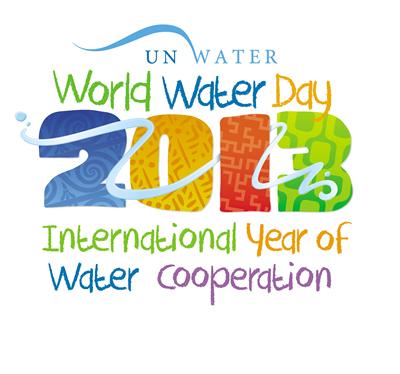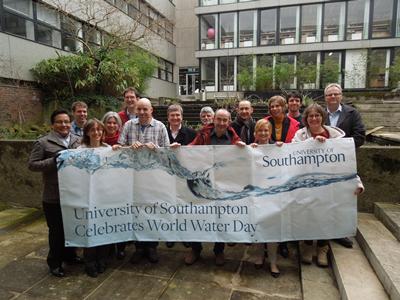Key Messages: World Water Day at the University of Southampton

This year the University of Southampton joined the global community in celebration of the UN International Year of Water Cooperation and UN World Water Day. The full day of thematic events- Water Quality; Energy & Water; and Ecosystem Services for Poverty Alleviation- certainly provided new insights into challenges, benefits and future opportunities for ‘water cooperation’.
Key Messages from World Water Day at the University of Southampton:
Note: further details re. multimedia (interviews, pictures, tweets, storify, presentations) can be found here.
Water Quality and Access-
- Although the Millennium Development Goal (MDG) target 7c of halving the proportion of people without sustainable access to safe drinking water has been met, 780 million people still do not have access to clean water. Presentation by Dr Jim Wright, Geography and Environment, University of Southampton.
- 2 million tonnes of sewage and industrial and agricultural waste is discharged into the world's waterways every year. Around 700,000 children die every year from diarrhea caused by unsafe water and poor sanitation and almost 2.5 billion do not have access to adequate sanitation.
- Technologies such as the Aquatest System can provide practical solutions to help prevent disease by allowing local people to identify for themselves when water supplies are faecally contaminated. The Aquatest Research Programme, funded by the Bill & Melinda Gates Foundation and led by the University of Bristol, is developing a user-friendly, low-cost water quality test that can be used on-site in developing country field conditions. Demonstration by Rob Matthews, University of Bristol.
- Human capital (focus on education) has a significant positive impact on access to safe drinking water, particularly in developing countries. Every second the urban population grows by 2 people. Urbanisation has a significant mitigating impact on the association between human capital and water access. Presentation by Sylvia Szabo, Social Statistics & Demography, University of Southampton.
- WaterAid has helped transform the lives of 17.5 million people worldwide by providing access to safe water and improved sanitation and good hygiene. The International NGO is showing the world how water changes lives through innovation community campaigns and involvement in the largest corporate project ‘the HSBC Water Programme'. Presentation by Alice Dibblin, University of Southampton and volunteer coordinator for the University of Southampton WaterAid group.
- Every year we withdraw 3,800 cubic km of freshwater and a whopping 70% is used in agriculture. Innovative sensor technology can be used as an intervention to meet human water needs to asses and monitor the impacts of agricultural and urban activities on water quality and runoff yield in climatic regimes and at the catchment level. Demonstration by Dr Nick Harris, University of Southampton.
Energy and Water: Energy for Development-
- By 2030, 47% of the world population will be living in areas of high water stress. 1.6 billion people live in countries with absolute water scarcity. Community based energy supply services, such as a solar plant, can provide sustainable solutions to collecting water, generating electricity and developing business. The solar canopy can also act as a rain collector during the rainy season. The collected water is stored for use throughout the year. The Kitonyoni solar power plant project, Kenya, is using energy supply services to create employment and provide economic revenue as well as social and humanitarian benefits to the local population. Presentation by Professor AbuBakr Bahaj, University of Southampton.
Ecosystem Services for Poverty Alleviation-
- Over 600million of the rural poor currently live on lands prone to degradation and water stress, and in upland areas, forest systems, and drylands that are vulnerable to climatic and ecological disruptions.
- The Ecosystem Services (ES) of river deltas often support high population densities, estimated at over 500 million people globally. Further, a large proportion of delta populations experience extremes of poverty and are highly vulnerable to the environmental and ecological stress and degradation that is occurring such as: urbanisation, agriculture intensification, increasing demand for flood management and increase water demand. Presentation by Dr. Craig Hutton, ESPA Deltas Research Coordinator, GeoData Institute, Geography & Environment, University of Southampton.
- Ecosystems - like a forest - provide multiple services that contribute to food and nutrition security directly (through harvested food products) or indirectly (through income-generating activities, but also through water and firewood for cooking food). There are three key interactions: Water, Forest and People. Trade-offs are constantly being made at different levels of decision-making. Presentation by Dr Kate Schreckenberg, University of Southampton.
- The concept of ES has become popular as a way to encourage discussion about the dependence of people on nature and what this means both socially and economically. Assessment of practicability of different methods and tools for ES analysis in the context of public management and development planning is needed. Presentation by Dr Kirsten Probst, German Development Agency,( GIZ), Member of the ASSETS advisory board.
- There are 276 international river basins and transboundary aquifer systems in the world. 60% of these lack any type of management framework.
- Science needs to be believable. Science needs to offer solutions. Policy makers need to use evidence. Presentation by Dr Yvan Biot Senior Scientist, Department for International Development (DFID).
- Without wetlands, the water cycle, carbon cycle and nutrient cycles would be significantly altered. Since 1900 the world has lost around 50% of its wetlands and around 60% loss in Europe. Protecting and restoring wetlands is a way to improve water security, access to clean freshwater, to support sustainable livelihoods for local communities, and to improve food and energy security. Presentation by Dr Daniela Russi, Policy analyst, Institute for European Environmental Policy (IEEP).
We would like to thank all our speakers and demonstrators who enabled the celebration to be a great success!

Other University of Southampton sites
Links to external websites
- Multidisciplinary Research Week 2013
- ESPA Deltas Project
- ESPA ASSETS Project
- WaterAid
- UN World Water Day Website
- DFID Website
- German Development Agency (GIZ) Website
- Institute for European Environmental Policy (IEEP) Website
- TEEB Website
The University cannot accept responsibility for external websites.